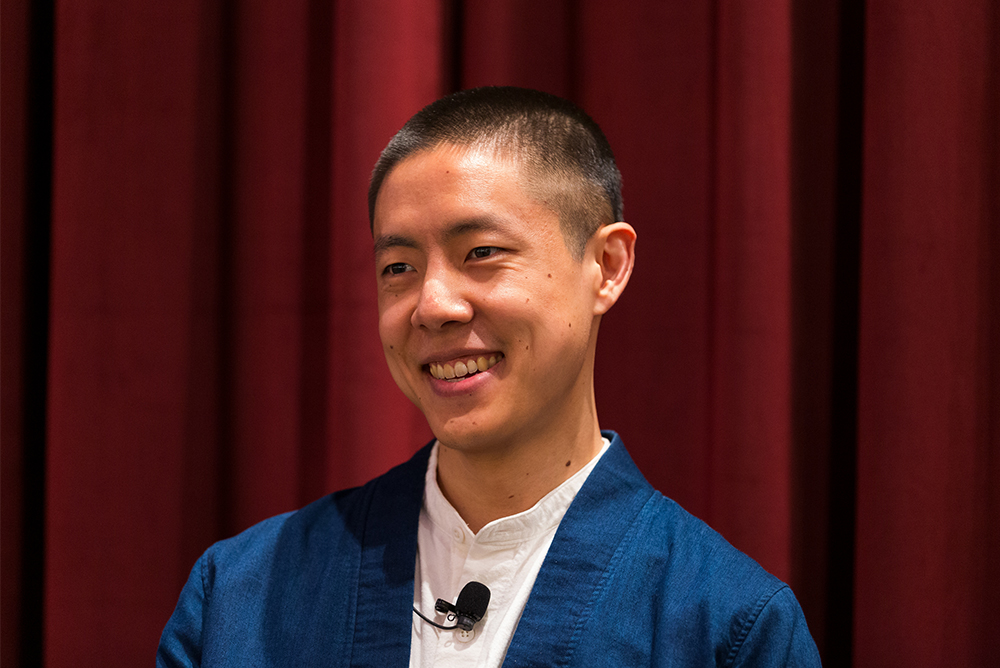
Photo by Ian Byers-Gamber.
Ryan Lee Wong is author of the novel Which Side Are You On. He holds an MFA in fiction from Rutgers-Newark and has organized exhibitions on Asian American social movements. Before joining us for “How Does L.A. Inspire First-Time Novelists?”, he sat down with us in the green room to chat about L.A.’s Korean food, building a healthy relationship to writing, and the special tradition of Rohatsu.
What do you miss about L.A.?
Korean food. Growing up, Koreatown was like a second home. My mom never cooked so when my dad was out of town, we’d go to Koreatown Plaza and would go to a naengmyeon or jajangmyeon restaurant. It was like home cooking for me.
What was the last book you checked out from the public library?
The Fire This Time by Jesmyn Ward, an essay collection. I checked it out because I had just read Ross Gay’s new book Inciting Joy, which I absolutely loved, and he recommended “Lonely in America” by Wendy S. Walters, which is in that collection.
What’s one reaction you hope people will have from reading from your novel?
The novel is a set of conversations between a son and his mother and a few other characters. My hope is for people to see this and start their own conversations across generations, across racial lines, across political beliefs. Because really, the question of the novel is, even if we disagree, how do we meet each other?
What’s a holiday tradition you partake in?
I’m a Zen Buddhist and every year we do Rohatsu, a retreat in December to mark the Buddha’s enlightenment. It’s a 5 to 7 day retreat in silence. On the last day, you get up early in the morning at like five to sit in the darkness and one of the teachers tell the story of the Buddha’s enlightenment by candlelight. When I did it the first time, it really opened my eyes to how powerful the practice can be, so it’s been very special to me.
If you can meet any writer, alive or dead, who would it be?
Eihei Dōgen, the founder of Soto Buddhism in Japan. He was this incredible writer and wrote prose that reads like poetry. He’d say these amazing mystical things and also practical things about, like, how you brush your teeth. I just want to know what he was like as a person, what was his energy like, what his person-to-person vibe was. All we have is this incredible record of writings he left that really guide our practice still, but I have no idea what he’s like.
What’s an unpopular opinion you have?
I’m aware I’m doing an interview right now, but I think in a lot of circles, there’s a belief that reading the news is inherently good, like ethically good. I don’t know if that’s true. The media is an industry. It’s very important to understand what’s happening politically and socially to a point, but I look around and see how many people around me are completely addicted to media, to the news, to refreshing the feed, and of course now we’re in an extremely polarized and divided set of realities. They are tools just like any other… and I think probably most Americans use them too much.
You live in Brooklyn now. What’s a place you’d recommend for people to visit?
I love Brooklyn Academy of Music (BAM). I’ve lived within a 20-minute walk of BAM almost my entire time in Brooklyn and it’s really been a part of my life and education as an artist. I’ve gone to the Next Wave festival many times and it’s been a really wonderful resource to teach me about things like dance and theater, which I’m not trained in, but I get to see really exciting examples of.
What advice do you have for new writers?
Publishing is nice, but not suffering is more important. I encourage everyone to cultivate a healthy relationship to writing. There’s so much pressure to push ourselves as writers to create “good” work, whatever that means, and there’s a real valorization of writerly angst and suffering but I don’t think any of that is necessary to creating meaningful art. Writing is challenging but it doesn’t have to be harmful for you.



